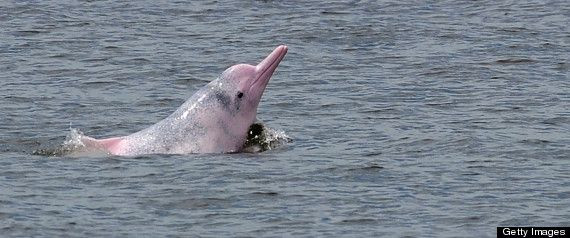
Brazil is home to a rare dolphin specimen -- the Amazon pink dolphin -- and the government has announced that it will be taking measures to preserve the species.
On Tuesday, Brazil's Fishing and Aquaculture Ministry announced that the South American nation would be temporarily banning the fishing of a specific breed of catfish, which requires using the Amazon pink dolphin flesh as bait. According to Ministry spokesman Ultimo Valadares, the ban on fishing the piracatinga species of catfish will go into effect next year for five years.
"That should give us enough time to find an alternative bait for the piracatinga," said Valadares to the Associated Press.
Nivia do Campo, president of an environmental activist group in the northern jungle state of Amazonas, revealed that in the Mamiraua Reserve, more than 1,500 freshwater dolphins are killed. She further added that ever since fisherman started using the Amazon pink dolphin as bait, in year 2000, the population of the species has seen an annual rate of decline of 10 percent.
The biggest market for the piracatinga catfish is neighboring country Colombia, where merchants encourage poor fisherman to use the dolphin flesh. The piracatinga is known as the "water vulture" because it feasts on decomposing matter in rivers.
Locally, the Amazon pink dolphins are not consumed by the community living by the river and for centuries, the dolphins were revered due to local myth. One particular legend states that dolphins transform into handsome men and are able to leave the water at night. As such, it is also considered bad luck to kill the dolphins.
Recently, scientists identified a new species of river dolphin -- a family of dolphins that inhabits the freshwater rivers and estuaries of Asia and South America -- in the Araguaia River basin of Brazil according to a new study published in online journal PLOS One.
The researchers cite that there are only 1,000 of the Araguaian boto dolphins living in the Araguaia river basin. In fact, river dolphins, as a group, are considered to be one of the rarest creatures in the world, as out of the four known species, there are on the Red List (i.e. critically endangered), as stated by the International Union for Conservation of Nature (IUCN).
© 2025 Latin Times. All rights reserved. Do not reproduce without permission.




